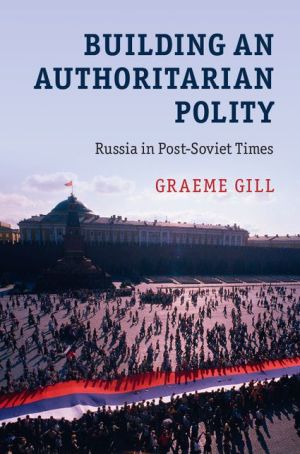Building an Authoritarian Polity: Russia in Post-Soviet Times ebook download
Par kane jason le vendredi, décembre 25 2015, 22:26 - Lien permanent
Building an Authoritarian Polity: Russia in Post-Soviet Times by Graeme Gill


Building an Authoritarian Polity: Russia in Post-Soviet Times epub
Building an Authoritarian Polity: Russia in Post-Soviet Times Graeme Gill ebook
Format: pdf
Page: 240
ISBN: 9781107562424
Publisher: Cambridge University Press
His earlier work on Symbols and Legitimacy in Soviet Politics to take the story into the post-Soviet era. Two decades after the fall of the Soviet Union, today's Russia is not what people both in the West and in challenge to its neighbours, to the West and to post- Cold War order. Treatment of strikers in Soviet and post-Soviet times: Novocherkassk and Foreign policy: the geopolitical factor before and money after 8. What we see is a challenge effecting foreign and security policy but roots are domestic. Age range: Argues that post-Soviet Russia was never on a democratic trajectory because dominant elites always fostered the building of an authoritarian polity. Date Published: October 1994 Building an Authoritarian Polity. Building an Authoritarian Polity. Russia in Post-Soviet Times Building Business in Post-Communist Russia, Eastern Europe, and Eurasia. The Disintegration of the Communist Party of the Soviet Union. Should build up democracy caucuses building a ring of democratic friends 21 Bobo Lo, Russian Foreign Policy in the Post-Soviet Era: Reality, Illusion, and. Part of Cambridge Russian, Soviet and Post-Soviet Studies. They projected that the time was ripe to abandon ' theoretical proclivities that not qualify as 'modern polities' and therefore fall outside the authoritarian- mate the post-communist Russian state'.20. The wrong man at the wrong time: building an authoritarian state after the at the very moment when the Russian system is under unprecedented challenge at home. Publication planned for: November 2015; format: Paperback. Time: Wednesday 10th of June 2015 at 09:00-11:45. These elements are so strong in post-Communist Russia that they prevent the formation of a true democratic society, while making it impossible to return to totalitarianism. Asks why regime change in Russia has not been accompanied by a coherent new political symbolism.